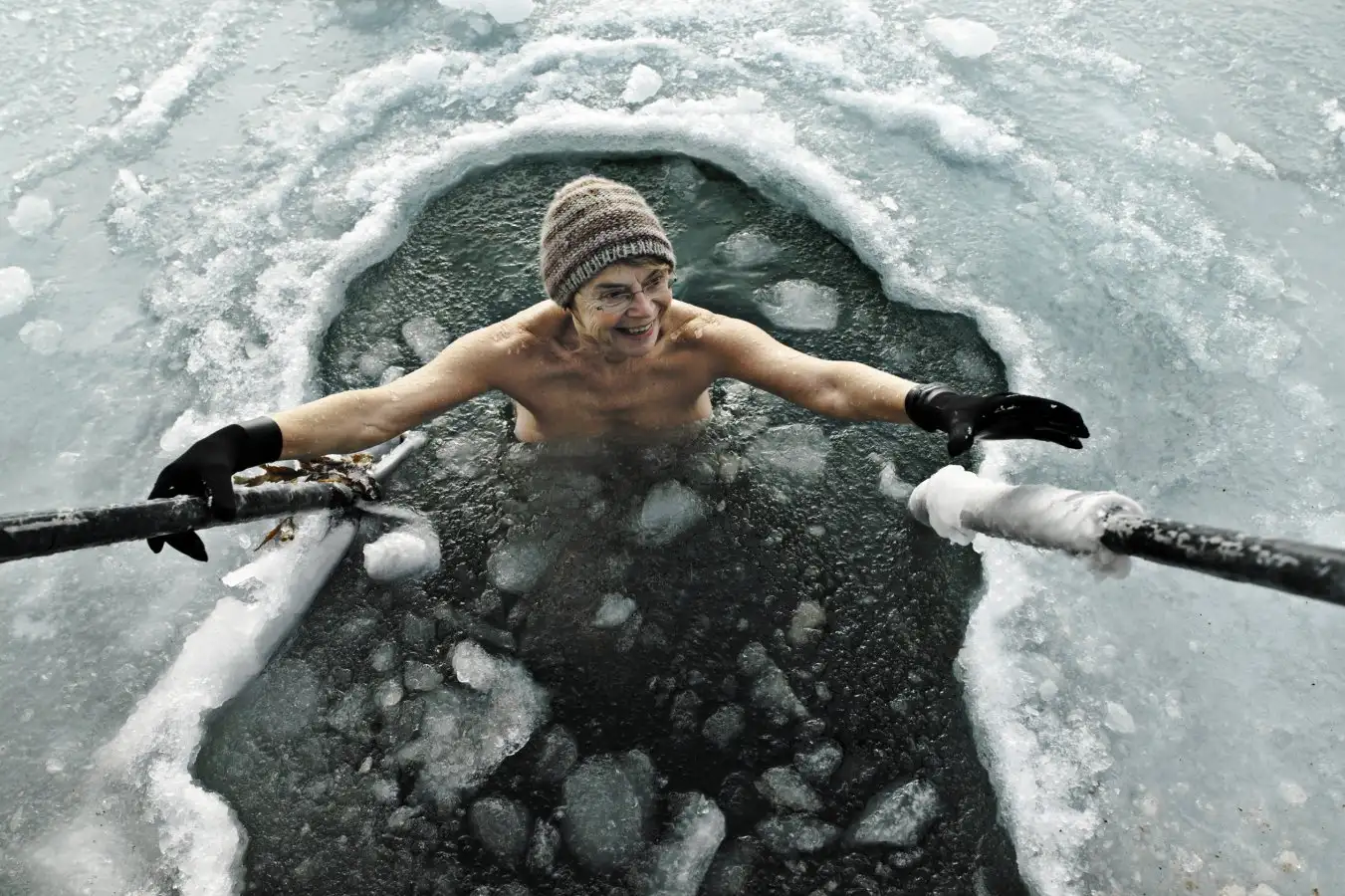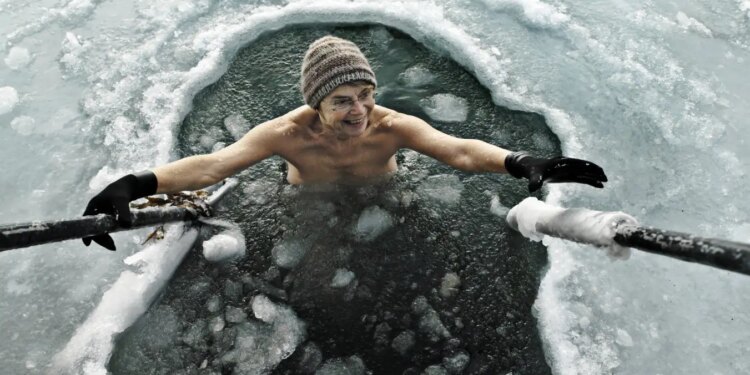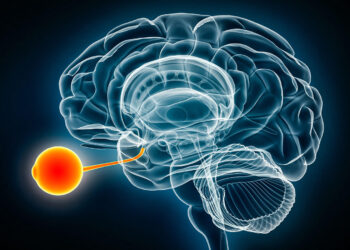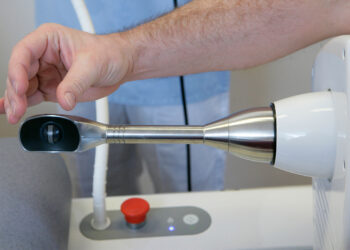
Swimmers in January at Beckenham Place Park lake in London
AMcCulloch / Alamy
It’s 8am and I’m standing at the edge of my local lake at Beckenham Place Park in London, the early morning sun just beginning to peek over the trees. A layer of mist is rising from the cold water and all is still – not even the ducks are braving a dip today. My friend and I, however, are standing in our bathing suits despite the water temperature sitting in single digits. The first step into the water always takes my breath away, but as my body acclimatises and we swim a wide loop, I feel like a new person.
Over the past few years, I’ve converted more than a few friends into cold-water devotees. My pitch is simple: nothing lifts your mental health quite like it. Until recently, my case was mostly anecdotal. But as more people are becoming enthused by ice baths, cold showers and winter swims, researchers are beginning to uncover exactly what these freezing plunges do to our brain chemistry. And as it turns out, my weekly dips may be reshaping my brain in lasting ways.
I’m not alone in loving cold swimming – around 6.8 million people in England now regularly swim outdoors, either in open water or outdoor pools, which tend to be fairly cold for most of the year. It’s hardly surprising, since there is now solid evidence suggesting that regular cold-water immersion reduces fatigue, lessens symptoms of depression and improves well-being – despite it also having some potential health risks, such as hypothermia, illnesses from unclean water, and in rare cases, heart problems.
For instance, in one study, 36 people who completed a four-month programme of open-water swimming for four days a week over winter showed significantly lower tension and fatigue compared with a group of non-swimmers who carried on participating in normal city life with occasional outdoor exercise. The swimming group also saw increased vigour, better memory and improved mood.
Even a single dip seems to have benefits: people who stood chest-deep in sea water at around 13.6˚C (56.5˚F) for 20 minutes reported reduced negative mood and increased vigour and self-esteem compared with a group who stayed on the shore.
Cold exposure acts on multiple physiological pathways, including the heart and immune system, and regular winter swimmers are known to have improved immune health, experiencing fewer colds and reduced risk of cardiovascular disease. But it’s the neurological effects that I find most intriguing.
For instance, the effect on your mood may be because exposing your semi-naked body to freezing water triggers an acute stress response. If you’ve ever jumped into the frigid ocean or done a cold plunge in a spa, you’ll know the feeling: your brain orchestrates a sudden spike in adrenaline, dopamine and cortisol – a cocktail of chemicals that gives you a similar high to the one you get after exercising.
Evolutionarily, this is a clever survival strategy. Exposure to extreme cold is life-threatening, so this “cold-shock response” delivers a burst of energy, increases your alertness, reduces pain and mobilises your stress response to help you escape danger.
It is also the reason that people can get into trouble swimming in cold water. Without taking proper precautions, it can make you inhale sharply, affect movement and cause heart attacks in rare cases. However, deliberately triggering this response in the modern-day setting of a quiet lake, watched over by lifeguards, and having had the right training gives me access to its benefits without the danger. Deficits in those same chemicals play a critical role in disorders such as depression and anxiety, so artificially boosting them may explain why mood is temporarily lifted after a swim.

The “cold-shock response” can increase alertness and improve mood
David Trood/Getty Images
There may be longer-term effects, too. Over time, as the body acclimatises to getting into cold water, its stress response changes. In one study, people who swam three times a week in cold water over 12 weeks released less cortisol by the end of the experiment than at the start, suggesting the body learned how to handle stress more efficiently. Moderating this response may have long-term benefits, since chronically high levels of stress hormones cause inflammation that is linked to a host of diseases and accelerated ageing. A recent review of the latest evidence around cold-water swimming suggests this adaptation may offer even broader mental health benefits, helping people with anxiety management, for example.
Our cold-shock response also releases proteins, such as RNA-binding motif 3, which supports the repair of synapses – the connections between neurons. In mice predisposed to develop a version of Alzheimer’s disease, increased levels of this protein protected them from neurological damage, leading some researchers to speculate that regular cold-water swimming may have long-term neuroprotective effects in humans, too – although this hasn’t yet been studied directly.
Cold-water exposure has powerful psychological effects, as well. Enduring something difficult – and let’s face it, even the most enthusiastic cold-water swimmers sometimes find it an endurance test on icy days – can build a sense of mastery and self-efficacy, what you might call grit. Add to that the social aspects that are a common part of swimming outdoors and you end up mirroring some of the factors that therapies such as antidepressants and psychotherapy hope to achieve. Indeed, there is emerging evidence that when used as a complimentary therapy, cold-water swimming can improve symptoms of depression over and above using pharmacological drugs alone.
Excitingly, researchers are even starting to directly examine the effects of cold-water swimming on the brain. For instance, Ala Yankouskaya at Bournemouth University in Poole, UK, and her colleagues scanned the brains of 33 people who don’t normally swim in cold water before and after a 5-minute whole-body bath in 20˚C (68˚F) water. It was the first time researchers had captured real-time information about how brain networks interact following cold-water exposure.
They discovered beneficial shifts in the connectivity between several major brain regions, particularly the medial prefrontal cortex and the parietal lobe – areas associated with emotional control, attention and decision-making. Activity in these areas is often disrupted in people with depression and anxiety, which may explain why cold-water swimming can act as a therapeutic tool.
Of course, it’s not all clarity and euphoria. There have been some rare cases of transient memory loss associated with cold-water swimming, typically in older adults, and it’s not clear what might be causing it. And of course, hypothermia is another risk factor if swimmers stay in too long. Still, I’m heartened that the clear-headedness and improved mood I feel after my dips are gaining some scientific support – and if I can keep it up, might even protect me from some age-related diseases.
Last week I heard rumours of a sauna being built on the bank of the lake, and wondered what additional benefits heat therapy might bring to my swims. I’ve read that alternating hot and cold might trigger certain changes to brainwave rhythms that could induce the most potent brain benefits of all. But that’s a topic I’ll explore in a future column – with first-person testing of the UK’s best saunas, naturally, all in the name of science.
Until then, if you find yourself near a lake or sea this winter, be brave and dip a toe. It might be cold, but your brain will thank you.
Swimming in water below 15˚C (59˚F) should always be done with a partner, a float, a bright hat and a full understanding of the potential risks and how to mitigate them. For more on water safety for cold-water swimming, the Royal National Lifeboat Institution has resources available.
Topics:
Source link : https://www.newscientist.com/article/2506082-cold-water-swimming-has-benefits-for-the-brain-as-well-as-the-body/?utm_campaign=RSS%7CNSNS&utm_source=NSNS&utm_medium=RSS&utm_content=home
Author :
Publish date : 2025-11-26 18:28:00
Copyright for syndicated content belongs to the linked Source.












